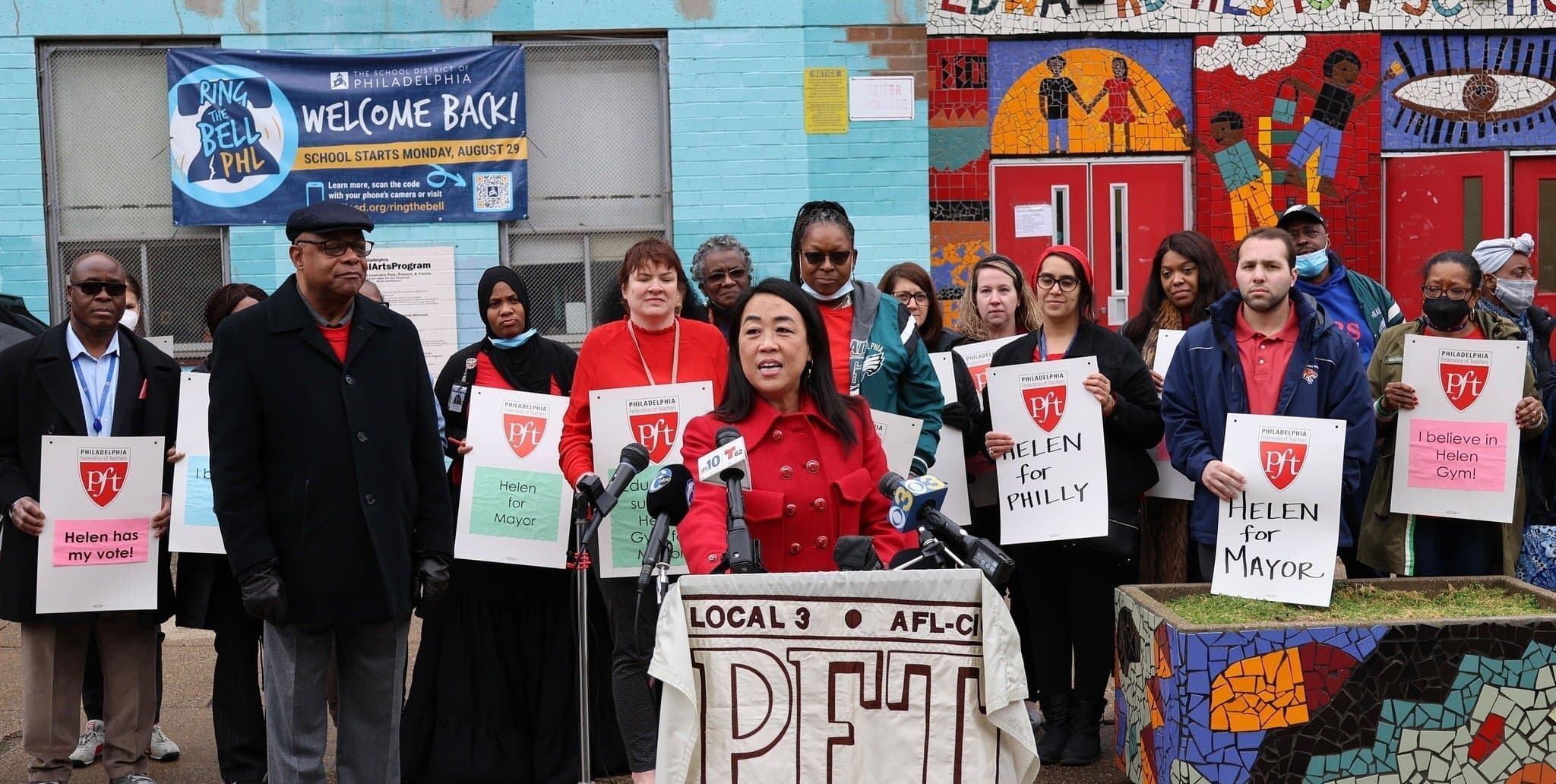“The argument to be waged against Gym is not that she doesn’t believe what she says: it’s that she’s a true believer, a policymaker driven by ideology over data and reason,” the article read.
If I’m being honest, I even found myself pulled in by these kinds of centrist currents. Before any of these headlines, when the race was just getting going, I was at dinner with friends when another dinner guest asked if we would support her. I said she’s obviously the best Left candidate, has been aligned with social and racial justice movements, but a voice inside me also levied the accusation that she’s all talk. I asked: “What has she gotten done? And why should we trust that she would stick with social movements once in office?”
One of the friends we were with had worked in City Council for several years on the staff of socialist and Working Families Party councilwoman Kendra Brooks. We’d done a lot of socialist organizing together in the past. My friend not-so-subtly raised her eyebrow at me: “What the heck do you mean?” she asked. “Helen’s gotten more done in council than most anyone would expect. If anything,” my friend said, “Gym is one of the more effective and pragmatic politicians. Her record bears that out.”
I trusted my friend, but I wanted to see for myself, and I wanted to understand where this narrative that Gym is all talk and no substance came from. So I took a closer look.
I first went to Gym’s City Council web page where I saw an unbelievably long list of her accomplishments: more than 100 unique entries across areas ranging from education to criminal justice reform to public transit. Together, with her previous years of organizing experience and significant victories I learned about, this forms a massive body of work. The list of accomplishments she’s had on council is literally too long to summarize properly, but here’s a selection.
Laws? She’s authored and helped pass them. She wrote legislation winning a Fair Workweek requiring employers to provide shift schedules at least two weeks in advance, led efforts for legislation aiming to put full-time nurses and clean filtered water in every school, helped secure $20 million in grants to address street violence, and, according to the City Council’s website, she co-sponsored the Emergency Housing Protections Act “which kept Philadelphians housed during the COVID-19 pandemic by enacting a local eviction moratorium; an eviction diversion program; a temporary ban on late fees; and requiring tenants be provided the option of repayment plays to get back on track with rent.”
The effort “helped reduce evictions by 75% over two consecutive years and prevented tens of thousands of cases of COVID-19,” according to the City Council’s website listing her accomplishments.
She also, according to the website, co-sponsored bills with other councilmembers to increase funding for the Housing Trust Fund, protect kids from hazardous lead paint in schools, and secure a $15 an hour minimum wage for city contractors and sub-contractors.
Important hearings? She’s convened them. She held the first-ever hearings on the issue of youth homelessness and helped win the first city budget line item to address youth homelessness. She also, according to the website, led investigative hearings to seek accountability for the City of Philadelphia’s use of force and teargassing of demonstrators at Black Lives Matter protests in May and June of 2020.
Task forces? She’s established and been on them. She established the Youth Residential Placement Task Force to curb the school-to-prison pipeline by reducing out of county youth placements that cost “the city and schools more than $100 million annually.” She formed an Anti-Eviction Task Force, which worked with the courts and agencies across the city to develop new programs for renters and advanced a full set of policy recommendations to better prevent and respond to evictions to help keep families in their homes.
She said she’d do all these things, and she did.
Gym is that rare combination of an effective movement-based organizer, leader, advocate and politician. Many have compared her to Chicago’s Brandon Johnson, who was elected mayor in April and who some critics also tried to undermine as all talk and no substance.
Gym co-founded of The Philadelphia Public School Notebook, which became a trusted outlet for education news in the city (it later became Chalkbeat Philadelphia). The publication produced some of the most trenchant and important reporting on public education in the city, like their tireless reporting on charterization and the mass closures of 2013-14. She was also on the editorial board of the influential education publication and organization, Rethinking Schools.
Her dedication to education justice goes deeper, too. She worked on a 2010 civil rights case to fight bullying of Asian American students at South Philadelphia High School. Along with The Asian American Legal Defense and Education Fund, Gym and allies maneuvered through the halls of justice — including the federal court system and the Department of Justice — and they won. The case was successful in winning an agreement with the DOJ to provide resources to help stem the violence. She also fought the awful routine of split grading at A.S. Jenks elementary school, helping pressure the school to give up the practice. They did.
Meanwhile, as if she needed any further validation, President Barack Obama gave her the Champions of Change award in 2014. The description of her on The White House’s website portrays the complete opposite of these silly accusations levied against her as a person with no substance.
“A former school teacher and journalist, she leads the board of Asian American United. … At AAU, she has organized against predatory gambling and led a campaign to address human rights issues in immigration and deportation practices. She helped found a Chinatown-based charter school serving many immigrant families and anchored a successful federal civil rights case focused on the responsibility of adults to create safe school environments free from bias and harassment,” The White House’s description of her read.
It goes on: “She is a co-founder of Parents United for Public Education, a citywide parent group that has successfully advocated for millions of dollars in new revenue for Philadelphia public schools.”
Despite the onslaught of negative attacks, I think the public and media tide has finally turned against the “all talk” line — and not a moment too soon. The election — the Democratic primary — is May 16. Prominent voices are calling foul and celebrating Gym’s effective practicality. In a piece in the Metro, we find Mark Aronchick, former city solicitor under former Mayor William J. Green III, who worked with dozens of council members, calling Gym “one of the most effective lawmakers.”
“I think she’s a problem solver, but she’s also a leader,” Aronchick told Metro. “She has a vision. She can bring people along on that vision.”
The Philadelphia Voice has featured her eviction diversion program, which gained national attention. The Tribune has used the label “activist” as a positive thing when characterizing Gym’s candidacy. Michael Coard, a lawyer and tireless advocate for Philadelphia’s Black communities, recently endorsed Gym in that publication, noting “her lengthy history of civic involvement.”
Nationally syndicated columnist Will Bunch has even said, in the pages of the Inquirer no less, that the city does indeed need “a bullhorn mayor,” and wrote that “Gym has set herself apart as the only candidate who fully grasps the root problems in the most desperate neighborhoods — and who wants to go big to actually address them.”
Bunch takes on the false notion that Gym’s ideas are all “pie in the sky” head on, writing that “in her seven years as an at-large City Council member, Gym has fought for what cynics had written off as lost causes and won a strikingly high percentage of the time.”
So, after all that, after the evidence of her accomplishments are so clear, how did I end up with the false idea that she didn’t get anything done? I was literally in the city council chamber when Fair Workweek passed, cheering. I testified at a hearing she organized on transforming Philadelphia’s school facilities finance.
Part of the reason is that Gym’s opponents and the media outlets disparaging her record don’t even have to be right to be successful. Her opponents are obviously wrong. But they just have to put the notion out there — as many times as they can — and let the current take over. In thinking about how I ended up with the false notion that Gym is all talk, it was clear that ideology is powerful and often unconscious, and this must have gotten to me somehow. And if it’s gotten to me, it’s likely reached other voters.
If Gym is going to win this thing, then it’s going to be up to all of us supporters to get out there — in person and digitally — to debunk this myth without propagating it any further. The best things we can do are sing her accomplishments and make sure our neighbors know what Gym stands for.
I reached out to Gym’s campaign about this all talk, no action narrative, and their communications director Maggie Hart told me that when “people claim that Helen doesn’t get anything done, what they’re often implying is that low-income renters, immigrant families, service workers, children in juvenile detention centers, and educators don’t matter … for people on the ground, for workers who now have fair schedules, for families who have a neighborhood public school to send their kid to, and for residents who have been helped by mental health crisis units, Helen’s track record is deeply felt.”
“On the campaign trail it’s clear that people want someone who has a big vision for what this city can be, and an ambitious plan to deliver it,” Hart said.
Hart also mentioned that the tactic by Gym’s opponents and the media isn’t terribly new — progressive candidates across the city (and country) have often faced this kind of smear. One thing I wondered about is whether the dominant ideology has been a technocratic and insider one, something that movement candidates have to break through to vanquish the shroud of impracticality placed around them. These movement candidates are so often relatively new on the scene: from Kshama Sawant in Seattle to Ocasio-Cortez to Johnson (who also endorsed Gym).
“Helen has a proven track record of delivering for working people, and I know she will be able to expand youth employment, strengthen schools, and empower mental health professionals,” part of Johnson’s endorsement read.
The case of Johnson is an interesting one to consider. He, like Gym, was a middle school teacher that got into organizing and made a name for himself in education and other justice movements and was supported by the teachers union. In the mayoral election he faced an onslaught of messaging about the impracticality of his candidacy— they called him a fraud, running against a moderate who posed as a brass tacks, money-guy (though we all knew better). Even though Philadelphia has no runoff and the teachers’ union is controlled by an old, moderate caucus, Johnson’s victory bodes well for Gym. It’s a signal that Left candidates can be unapologetic for their movement work and win.
Politico made a point in 2016 of noting that Sanders “had big ideas but little impact on Capitol Hill.” Fox News literally ran a headline in 2021 asking “Is AOC all talk and no action?” And it was all false. While he didn’t win the Democratic nomination, Sanders took control of the powerful Senate Budget Committee and carved out a path for a significant Left presence in politics nationally. Ocasio-Cortez won her insurgent campaign for Congress in 2018 and became one of the most powerful voices of that nascent left wing. And Johnson toppled Paul Vallas — who outspent him by $8 million — to become the leader of America’s third largest city.
It’s no accident that these potent politicians have all endorsed Gym recently. Gym has done the work to earn it — and it feels like the narratives against her are dissipating and the tide has turned in her direction. An Emerson College poll recently showed that Gym is leading the field with 20.5%. We can only hope that on May 16 we get to celebrate in the same way Chicago has, that we’ve put a movement-backed candidate who knows how to get things done in charge of our city.
This article was originally published at In These Times and is reprinted here with permission. As a 501©3 nonprofit, In These Times does not support or oppose any candidate for public office.







